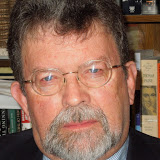Moreover, as Lippmann famously asserted, truth and news are not the same thing. "The function of news is to signalize an event, the function of truth is to bring to light the hidden facts." [Ibid, p. xiv] Thus, given these limitations of the mind and the news media. Lippmann concluded that the world had become too complex for even the most educated men of integrity to fully comprehend.
Unfortunately, what applies to individuals also applies to nations. Consider the national "pseudo-environment" of the United States: "American exceptionalism." Is it anything more than faith, devoid of any first-hand experience, that the United States has a special place in God's plans for mankind? Faith buttressed by ceaseless jingoistic advertising?
And although the religious and nationalistic hot air inflating the balloon of American exceptionalism can be punctured easily -- simply consider the city of New Orleans after Hurricane Katrina -- the narcissism both feeding and flowing from this pseudo-environment blinds even thoughtful individuals to their country's many failures. Consequently, by default, it also promotes a knee-jerk tendency to blame others - including immensely less powerful, influential and less blessed-by-God nations -- for America's many self-created problems.
Might mark the end of the post-cold-war era? Yes, according to Friedman, "unless China and Russia get their act together." Wow! First of all, Friedman ignores the gigantic historical elephant in the room - the fact that the United States first developed the atomic bomb, was the only country ever to drop it on another country, the only country to threaten its use on other nations dozens of times, while remaining to this day the state-of-the-art innovator of new uses (bunker busters) in order to continue to threaten or use such dreadful weapons.
But, rather than cite "10/9" as the end of an era, and then blame China and Russia for not persuading North Korea and Iran to end their nuclear programs, why not cite "3/19" for exacerbating the proliferation problems facing the world today? 3/19 is, of course, March 19, 2003, the fateful day the United States launched its illegal, immoral preventive war against Iraq.
First, consider Defense Secretary Donald Rumsfeld's slip of the tongue, as reported by Bob Woodward in State of Denial, when discussing how America's soldiers were worried about being killed by Iraq's chemical weapons. "We never - none of us ever believed that they had nuclear weapons. The only real worry that we had was chemical." [p. 102] (Given Rumsfeld's slip, didn't Bush, Cheney and Rice lie when they spoke with certainty about Iraq's nuclear program, thus scaring Congress, the media and the American people into war with reckless rhetoric about aluminum tubes, uranium from Niger, and mushroom clouds?)
Second, recall the initial intent of David Frum and Michael Gerson, when they formulated the phrase "axis of evil." Initially, they intended the phase to cover "the relationship Bush was seeking to establish between Saddam Hussein's regime and 9/11." But Condoleezza Rice and Stephen Hadley, "aware of the secret planning for Iraq," were "worried that singling out Iraq as the embodiment of the "axis of evil" connection between WMD and terrorism would appear to be a declaration of war." So she and Hadley suggested adding other countries." [Woodward, Plan of Attack, pp.86-87]
Although President Bush liked the additions, the attempt to disguise America's plans for Iraq by adding Iran and North Korea to the "axis of evil" had serious consequences. According to Iran scholar Zhand Shakibi (London School of Economics), Bush's axis of evil speech convinced Iran's President, Mohammad Khatami, that cooperation with and political concessions to the United States would not advance Iran's interests.
According to Professor Shakibi, the invasion of Iraq explains the victory of hardliner President Ahmadinejad. Moreover, according to Professor Shakibi, the failure of the United Nations to prevent the invasion of Iraq meant that it was incapable of protecting Iran, thus its renewed emphasis on its nuclear program. [Zhand Shakibi, Unpublished paper presented at the 15th Annual Russian-American Seminar, St. Petersburg State University, Russia, 19 May 2006]
Third, the Bush administration's preparations for war with Iraq not only caused it to delay responding to urgent intelligence about North Korea's nuclear program, but it also provoked the program's acceleration. [Seymour M. Hersh, "The Cold Test," The New Yorker, Jan. 27, 2003]
Recall that the Bush administration, for fear of being diverted from its quest to invade Iraq, sat on classified intelligence about a secret second nuclear program in North Korea until an unwitting Congress had voted to give Bush the authority to invade Iraq. Only after its vote, was congress informed that a genuine nuclear threat existed, but in North Korea.
Also recall Don Oberdorfer's recent words, reported on the Oct. 9, 2006, NewsHour with Jim Lehrer: "Shortly before the United States invaded Iraq, I was in North Korea. And a North Korean general said to me, 'We see what you're getting ready to do with Iraq, and you are not going to do it to us.' And I think his message was: We're going to get weapons that are going to make you pause if you think about coming after North Korea."
Such evidence suggests that, when it comes to the nuclear programs in Iran and North Korea, the lying "Iraqi Freedom" warmongers in the Bush administration have much to explain.
And to those Americans who still don't get it: 3/19, not Friedman's 10/9, marks the end of the post-cold-war era. They would do well to carve that date into their individual pseudo-environments, notwithstanding the fact that, by accepting 3/19, much of the blame (certainly not all, perhaps not most) for the reckless behavior of Iran and North Korea falls on the Bush administration and the United States of America. But, after all, isn't it about time for Americans to accept responsibility for the failures of the leaders they voted into office?





